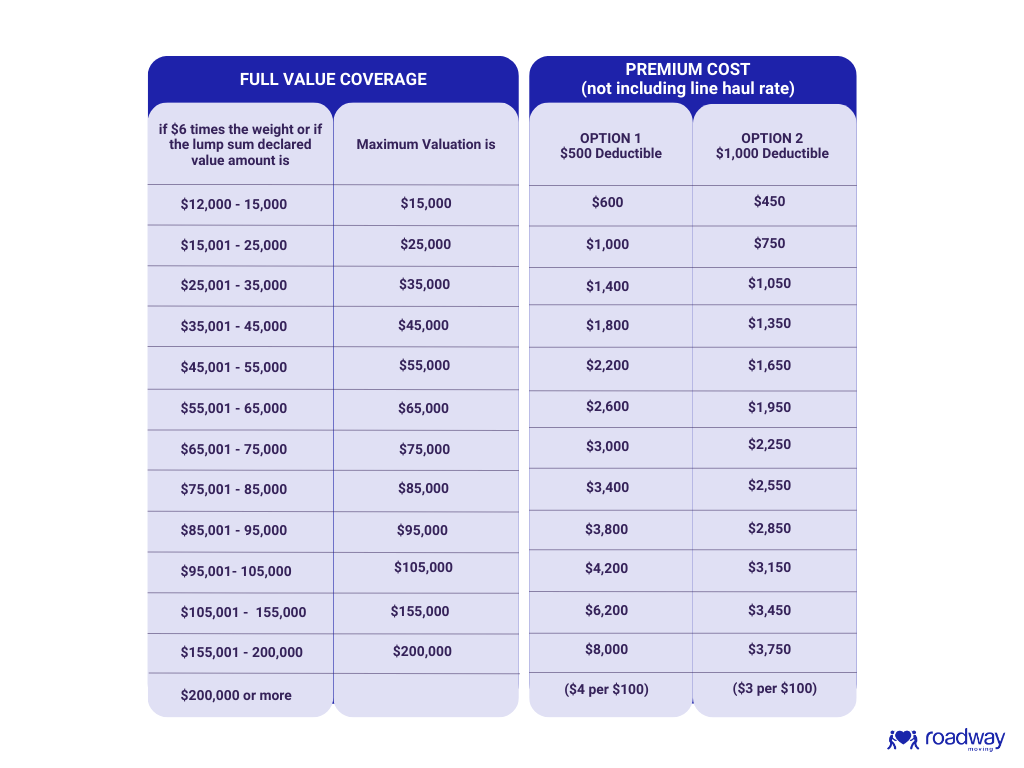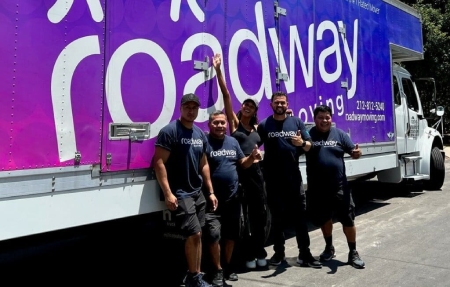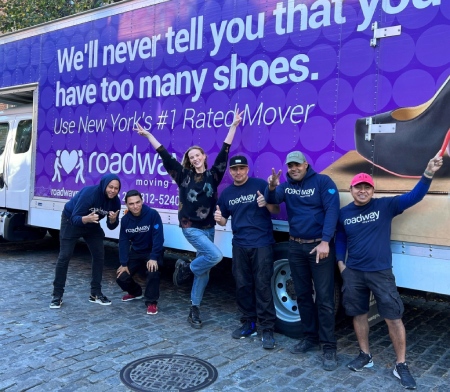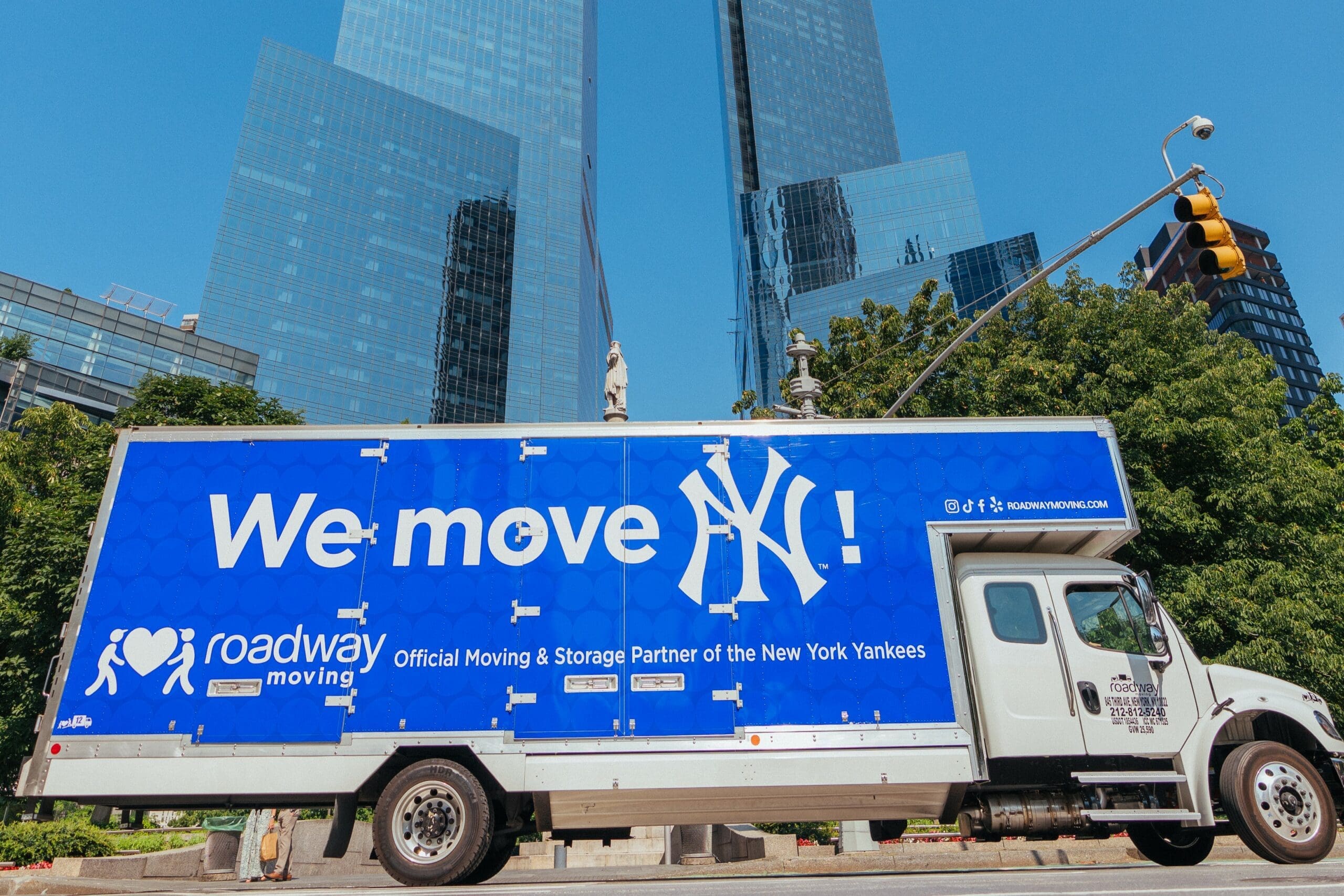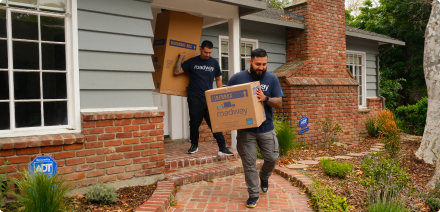

Full Value Protection
Discover your options and learn how to protect your belongings during a move with a moving company’s protection coverages.
Understanding full value protection coverage
Welcome to our informative page on Full Value Protection! Moving can be a complex process, and understanding the options for protecting your belongings is crucial.
In this guide, we’ll explore Full Value Protection and its characteristics, highlighting the differences between it and traditional insurance options.
We aim to provide you with essential insights into the coverage offered by Full Value Protection, empowering you to make informed decisions when it comes to safeguarding your possessions during a move.

Full Value Protection is a comprehensive coverage option offered by your moving company to safeguard your belongings in the event of damage during the move up to the declared value of the items.
It’s essential to note that it’s not an insurance policy in the traditional sense, as it doesn’t rely on proving negligence to cover your losses. Instead, it’s based on the weight of your entire shipment and it reflects the monetary value of that responsibility.
An insurance is a different legal contract with different policy terms depending on the providers and it needs to be discussed directly with them.
There are several differences between Full Value Protection and an insurance.
1. While FVP is bought from your moving company, an insurance is purchased separately from a third-party insurer (ex: Stage Farm, Baker International Insurance, Progressive, or MovingInsurance.com).
2. The cost of a Full Value Protection can vary depending on the value of your belongings and the deductible you choose, while third-party insurance may have a different pricing structure.
3. In terms of coverage, under Full Value Protection you are covered for the declared value of your shipment up to a specified limit (typically based on the weight of your items and may be subject to a deductible) and only for a damage or loss caused by a moving company; on the contrary, an insurance may have different coverage limits and terms depending on the insurer. It also may offer additional protection options (against natural disaster or theft).
While insurance is designed to provide coverage for various risks and typically offers a level of financial protection, Full Value Protection (FVP) provided by moving companies has its limitations.
FVP, in the context of moving, offers compensation based on the weight of the shipment rather than the actual replacement cost of individual items. This means that if valuable items are lost or damaged during the move, the reimbursement may be insufficient to cover their full replacement value.
FVP in the moving industry is a specific service with limitations, and individuals relying solely on FVP may not have the same level of comprehensive coverage and peace of mind as they would with a well-structured insurance policy.
It’s essential for individuals to carefully consider their specific needs, and assess whether additional insurance coverage is necessary for their valuable belongings during a move.
Opting for Full Value Protection (FVP) during a move is crucial for a higher level of protection and financial security. FVP ensures that the moving company takes responsibility for the replacement or repair of damaged or lost items based on their market value. This option provides peace of mind by holding the moving company professionally accountable for the safe transport of belongings, reducing stress during the moving process. Additionally, FVP reflects a commitment to handling items with care and offers a degree of legal protection.
While FVP doesn’t provide the same comprehensive coverage as an insurance, it does offer an added layer of protection during the moving process compared to the minimum level of liability (Limited Liability).
The standard Full Value Protection coverage is determined by multiplying the estimated weight of your shipment by a legally mandated minimum rate of $6 per pound. For instance, if your shipment weighs 6,800 pounds, your coverage would amount to $40,800. It’s worth mentioning that you can choose to increase this coverage before the loading process begins. The rate per pound will be calculated considering the evaluation of the entire inventory during the estimate phase that you have to communicate.
The value of the entire shipment, indeed, is based on the declared value by the customer. For this reason, it is important to list all the items in the inventory form, to ensure that they’re covered.
In the case of damage or loss, the value of an item covered under Full Value Protection is determined by dividing the value of your entire shipment by its weight, depending on the deductible you select.
For example, if your shipment weighs 10,000 pounds and has a total value of $100,000, the per-pound value is $10. If a 100-pound item is damaged, its value under Full Value Protection would be $1,000 (100 pounds x $10).
Under Full Value Protection, your moving company will first attempt to repair the damaged item to restore it to its original condition. If repair is not possible, you have two options. You can ask for:
- 1. Reimbursement for the cost of repair: the company will reimburse you for the expenses incurred in repairing the item.
- 2. Replacement with a similar item or kind or Payment for the cost to replace it: the company will replace the damaged item with one that is of like, kind, and quality. It’s important to note that the moving company may retain the damaged item when choosing this option.
It’s crucial to understand that when a replacement is provided, it takes into consideration the condition of the damaged item and the market value of the item. For example, if your two-year-old washing machine is damaged, you will receive compensation based on the fair-market value of a two-year-old washing machine, not a new one.
Moving companies are not obligated to reimburse you for items valued at more than $100 per pound unless they are specifically listed on the shipping documents. This regulation is established by the Surface Transportation Board, a federal organization overseeing moving companies.
If there is something in the truck that costs more than $100 per pound, must be declared in advance, otherwise your mover is not liable to any damage caused to such items.
When opting for Full Value Protection, you must declare items in your shipment that are valued at $100 or more per pound. This includes items like artwork, jewelry, high-end furniture, designer clothes, antiques, collectibles, and electronics. Failure to list these items on your Inventory Form may result in reduced compensation if they are lost or damaged during transit.
For instance, even if a pair of earrings is worth $800 but weighs less than a pound, listing them on the form is crucial to ensure you receive the full replacement value in case of loss or damage.
Choosing your deductible is typically required to determine the level of your coverage under full value protection. The deductible represents your initial out-of-pocket payment before the coverage kicks in. In other words, it’s the initial financial responsibility you have when filing a claim. The deductible amount varies based on the value of your belongings.
Roadway, for example, provides two fixed options, $500 and $1,000 deductibles. If you choose, for instance, a coverage that has $500 deductible, you would need to cover the first $500 of any loss or damage yourself.
It is important to understand that the choice of the deductible can have a direct impact on the premium cost. If you choose a higher deductible, it means that you’re agreeing to cover a larger portion of the cost, if you ever need to make a claim. Since you are taking more financial responsibility upfront, your moving company typically charges you a lower premium for your coverage. In other words, your payment for the coverage will be lower.
Learn more about coverage levels options and premium costs offered by Roadway on our FAQ.
Valuation coverage does not cover items in boxes that the moving company did not pack and it doesn’t cover compressed wood items. It also does not protect against natural disasters such as fire, hurricanes, tornadoes, windstorms, hail, etc.
Items damaged while in storage not controlled by the moving company are also not covered, like items not listed in the inventory form and whose value needs to be declared by the customer.
If you choose not to opt for Full Value Protection coverage, you will automatically receive Limited Coverage Liability, often referred to as “60 cents per pound” coverage. This basic protection provides limited reimbursement based on the weight of your items in case of loss or damage during the move. It is suitable for low-value items, and it doesn’t require any additional costs.
For instance, if you have a 10-pound item and it is damaged during the move, you would receive $6.00, or 60 cents per pound, to replace it.
Limited Liability is also known as “Basic Coverage” and “60 Cents Per Pound” because it adheres to the minimum requirements set by the Department of Transportation and U.S. Federal Law. This protection incurs no additional charge, but you must accept it by signing for it on the Bill of Lading.
If your belongings are damaged or lost during the move, you can file a claim with a moving company only if you have opted for either Full Value Protection or Limited Liability coverage. If you have chosen third-party insurance, the insurance company handles the claims process, requiring you to file a claim directly with the insurer. To file a claim with us, you can either call our customer service or click here.
Our customer service team will promptly initiate the claims process upon your contact.
Moving Coverage FAQ
We’re here to make coverage options simple and explained.
Here is a list of some of the most frequent and important questions that customers have when inquiring about moving insurance. If there is anything else that you would like to know about moving insurance, please fell free to reach out to us via form or give us a call at (212) 812 5240.

Frequently Asked Questions
Limited coverage is the default coverage option provided by most moving companies. It generally provides basic protection for your belongings while they are in transit, but it is usually limited to a certain amount per pound of your items.
This means that if your belongings are lost or damaged during the move, the moving company is only responsible for reimbursing you up to a certain amount per pound of the items that were damaged or lost.
Imagine you have an item that weighs 10 pounds. If something happens to the item during your move, your moving company will only give you $6.00, or 60 cents per pound to replace it.
That’s because the “60 cents per pound” coverage means that for every pound you move, the moving company will only give you 60 cents if anything gets damaged or lost.
Limited Liability is also called “Basic Coverage” and “60 Cents Per Pound” because it is the minimum required by the Department of Transportation and U.S. Federal Law. There is no extra charge for this protection, but you need to accept it by signing for it on the Bill of Lading.
Full value protection is an optional add-on service offered by moving companies. It provides more comprehensive coverage for your belongings while they are in transit. If your belongings are lost, damaged, or destroyed during the move, the moving company is responsible for repairing or replacing them, or providing you with a cash settlement for the full current market value of the items.
A Bill of Lading is a legal document that outlines the details of your move. You’ll see details on the items being moved, the type of coverage you have selected, and any applicable fees and charges.
If your belongings are damaged or lost during the move, please file a claim here. If you have chosen to use third-party insurance, the insurance company typically handles the claims process, and you’ll need to file a claim directly with the insurer.
Full value protection provides coverage for the declared value of your belongings, up to a specified limit. This limit is typically based on the weight of your items and may be subject to a deductible. Third-party insurance may have different coverage limits, and the terms of the policy may vary depending on the insurer.
The deductible represents your initial out-of-pocket payment before the coverage kicks in. The deductible amount varies based on the value of your belongings.
Roadway offers two levels, $500 and $1000. See the table below:
